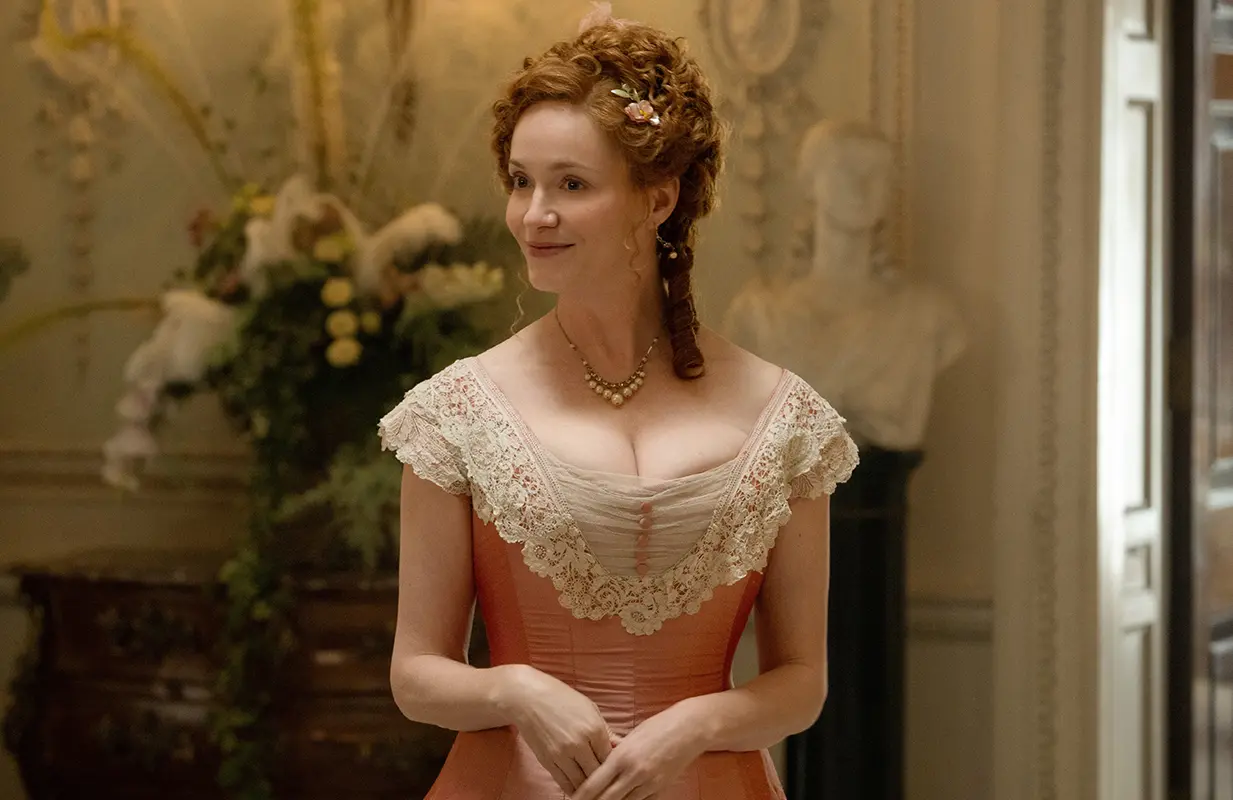The Buccaneers Sets Itself Apart From All the Other Bridgerton Knock-Offs
-
 Christina Hendricks in The Buccaneers (Photo: Apple TV+)
Christina Hendricks in The Buccaneers (Photo: Apple TV+)It’s a truth universally acknowledged that once a fresh new television show becomes a hit, Hollywood will try and replicate it over and over, with largely diminishing returns. So it's unsurprising that after Bridgerton became a global phenomenon, we got a Queen Charlotte spin-off, The Gilded Age, and new adaptations of Dangerous Liaisons, Persuasion, and Mr. Malcolm’s List. All feature diverse casts in period stories, decked out in lavish costumes and peering lustfully at one another.
Apple TV+’s The Buccaneers features a similarly talented ensemble and handsome set design that made Shonda Rhimes’ Netflix series such a treat, but with an unfinished Edith Wharton novel as its source material, it has a more thematically complex core. The new series is set in the late 19th century, when new imperialism began, the Franco-Prussian War raged on, and the upper echelons of British society faced an existential threat from overseas that chilled them to their core: rich Americans.
The Buccaneers are a group of young women from fantastically wealthy American families who are far more headstrong and rebellious than any of Bridgerton’s heroines. The British aristocrats they encounter and occasionally marry hold on to their traditions, the old world becoming painfully out of step with the other side of the Atlantic, which is racing ahead in industrial innovation, building skyscrapers and lavish homes that favor lightbulbs over candelabras.
Kristine Frøseth, best known for leading Lena Dunham’s sexual odyssey Sharp Stick, stars as Nan St. George, and rounding up the ensemble of young American women are Alisha Boe as Conchita Closson; Josie Totah as Mabel Elmsworth; Aubri Ibrag as Lizzy Elmsworth; and Imogen Waterhouse as Jinny St George. They are guided in turn by Christina Hendricks, who, as well as being born to fill out the sumptuous period costuming, brings the fast wit and warmth to matriarch Mrs. St. George that made her Mad Men turn so beloved.
The women dance, swoon, and snark about the patriarchy with aplomb, and the male characters fade into the background. Though a handsome group of men in britches is lining up to sweep them off their feet, you’d be hard-pressed to remember their names or their deal at the end of each episode.
Like Bridgerton's casting ethos, The Buccaneers isn’t colorblind enough. An audience can watch a period show in good faith and accept a variety of skin tones alongside 21st-century dentistry and unmoving foreheads, but British society’s reaction to Black actress Alisha Boe’s race is made into a character arc. The first of our merry crew gets married to Lord Richard and moves to the U.K. Much of her story comes down to her lamenting how she looks and that her subsequent children will look “different” than her English family.
The subtle alienation Conchita faces because of her race is jarring and seems more contemporary Meghan Markle than Gilded Era racial politics. And it's not uniform across the rest of the cast, as Guy Thwaite’s (Matthew Broome) complexion goes unacknowledged. The injections of queerness, which we won’t reveal here, that weren’t so explicitly present in the source material are more successful. Though the performances of the queer characters are just as rich and complex as their straight counterparts, their scenes are distinctly less steamy.
This “having your cake and eating it” approach to adapting the text for the modern audience means The Buccaneers doesn’t do subtlety. Conchita seems shocked to find herself undervalued as a woman in (checks notes) the 1870s and earnestly says of her marriage to an English aristocrat, “We boarded that ship as equals and it's like every inch he got closer to home he got further away from me.” As if late 19th-century America was a glittering feminist Utopia. And Nan explains that “Girls are taught to believe that if a story isn’t a love story, it’s a tragedy” and that “I was never meant to be the main character” in her opening narration, but she’s also clearly a main character, pursued as she is by dashing suitors who could grace the cover of any corset-ripping romance.
Maybe expecting The Buccaneers to be fun and truly subversive is asking too much — perhaps the simple pleasures in watching vivacious women take on stuffy British aristocrats still clinging to debutante balls and notions of old versus new money is provocative enough. There is plenty of joy to be had in just spending time with beautiful people and stunning estates. Conchita practically breaks the fourth wall to remind the streaming audience, “Girls, I've been so starved of beauty and chatter!”
The Apple+ TV show doesn’t stick fastidiously to the source material or period accuracy and wraps up with the big girl-power-friendly beats you’d expect. But it also doesn’t abandon the light despair the novelist saw in being trapped in these gilded cages, and in those moments where it moves away from handsome dukes and gorgeous gowns to uncover the rot in the foundation, the show distinguishes itself as more than a Bridgerton knock-off. It's easy to get caught up in the shiny surface of such a handsomely made program and its on-the-nose dialogue, but the show does, at times, have much more to say. The Buccaneers may not be as revolutionary as it intends, but it certainly adds a little spice to the increasingly bland genre.
The Buccaneers premieres with three episodes November 8 on Apple TV+.
Leila Latif is Contributing Editor to Total Film, the host of Truth & Movies: A Little White Lies Podcast and a regular at Sight and Sound, Indiewire, The Guardian, The BBC and others. Follow her on twitter @Leila_Latif.
TOPICS: The Buccaneers, Apple TV+, Bridgerton, Alisha Boe, Aubri Ibrag, Christina Hendricks, Imogen Waterhouse, Josie Totah, Katherine Jakeways, Kristine Frøseth, Matthew Broome